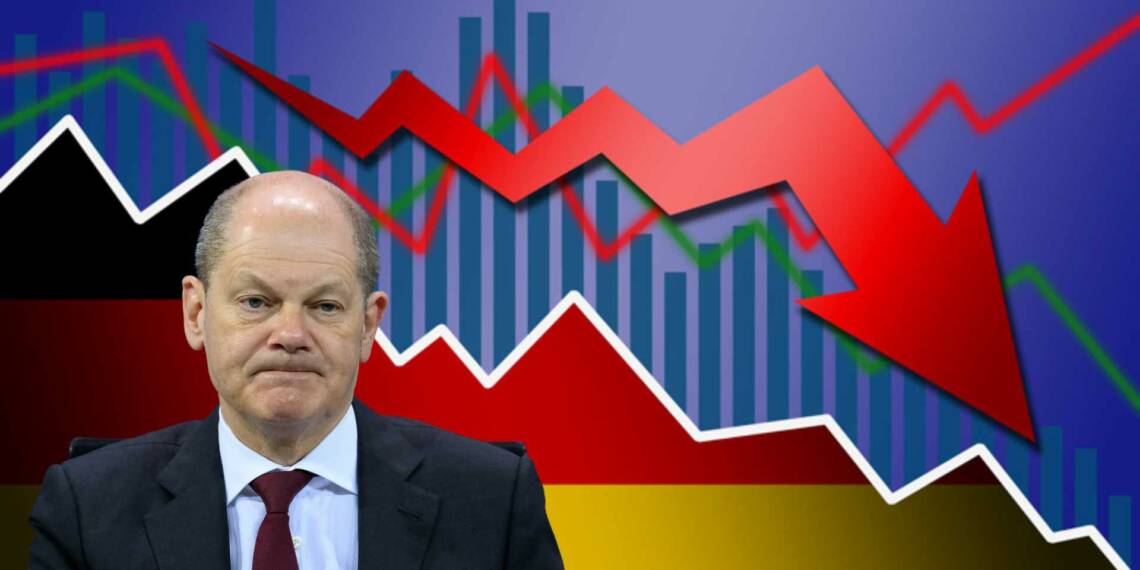In early 2023, Germany declared its entry into a recession, marking a grim period for Europe’s economies. Recent data reveals a deepening crisis, indicating a significant downturn in Germany’s economy. There is a new survey making rounds in Berlin now which indicates an irreversible radical transformation, painting a bleak future.
Germany will continue to face daunting challenges ahead as it grapples with the harsh realities of economic decline, casting a shadow over its financial landscape. The latest survey paints a harrowing picture of Germany’s economic future, sending shockwaves through the nation. Entrepreneurs, gripped by deepening pessimism, foresee a worsening state for the EU’s largest economy.
Reportedly, the Association of German Chambers of Industry and Commerce’s (DIHK) survey reveals a bleak reality: businesses are slashing investments and halting hiring, highlighting the absence of a sustainable recovery. Among 24,000 surveyed companies, a staggering 12,000 view Germany’s economic policies as a significant risk.

Industry insiders are increasingly contemplating leaving German soil due to mounting concerns. DIHK Managing Director Martin Wansleben’s words echo a somber truth: “We see no sign of a self-sustaining upswing… companies are consistently revising their investment plans and hiring intentions downward—both into negative territory.”
This unsettling sentiment casts a dark cloud over Germany’s economic landscape, foreboding challenges that lie ahead. The bleak outlook continues to intensify for Germany’s economy.
No Improvement in Sight: Big Reasons Why Germany is Doomed
A meager 13% of surveyed firms anticipate improvement in the next year, while a significant 35% brace for further deterioration, predicting a continuous decline in the German economy. The DIHK survey underscores the formidable challenges ahead: soaring energy and raw material prices pose significant threats to German businesses.
Additionally, the scarcity of skilled workers and feeble domestic demand loom large as major hurdles for companies. Germany indeed faces tumultuous times as its economy remains stagnant for over a year, marred by a recession attributed to the energy crisis, diminished Chinese demand, and escalating interest rates.
Economists have revised their forecast, anticipating a 0.5% contraction in 2023, followed by zero growth in 2024. This pessimistic outlook aligns with S&P Global’s recent report, indicating a sharper contraction in private-sector activity this month.
Read More: Germany exposes Germany! The Russian Energy Affair Still Continues
Where it all went Wrong: Ukraine
Now here a major question arises. Where did it all go wrong? Well, Germany is known for taking too many missteps, including taking unwanted migrants to Russia’s invasion of Ukraine has dealt a severe blow, with the energy-intensive sector witnessing an 18% drop in output by July 2023.

In contrast, China, once a partner, has transformed into a fierce competitor of Germany. It is poised to surpass Germany as the world’s second-largest auto exporter. The struggle to hire skilled workers at reasonable wages exacerbates the crisis. Additionally, underinvestment looms, leaving infrastructure lagging and productivity undermined.
This decline ripples across Europe, dragging down the entire continent’s growth prospects. Companies are divesting from Germany, fearing the worst. Yet, amidst this darkness, there lies a glimmer of hope – a chance for Germany to reinvent itself. Implementing astute fiscal policies could potentially salvage the economic powerhouse. However, time is of the essence.
Read More: France dashes Germany’s biggest hope to revive its economy
Without swift action, Germany risks dissolution, taking the Eurozone down with it.
Germany’s sole mistake, Ukraine, has triggered a chain reaction, underscoring the fragility of the interconnected global economy. Now, only and only decisive action can pull Germany back from the brink of disaster. But Can the German Chancellor Pull it off?
Watch More:








